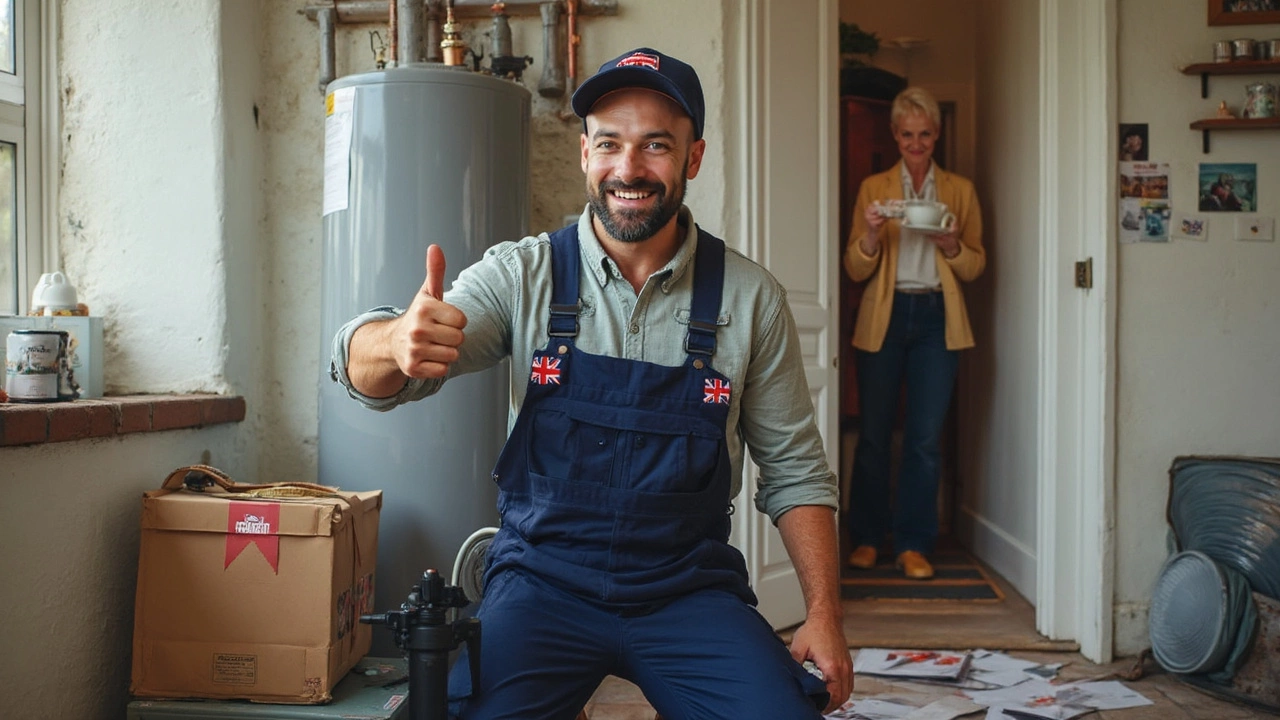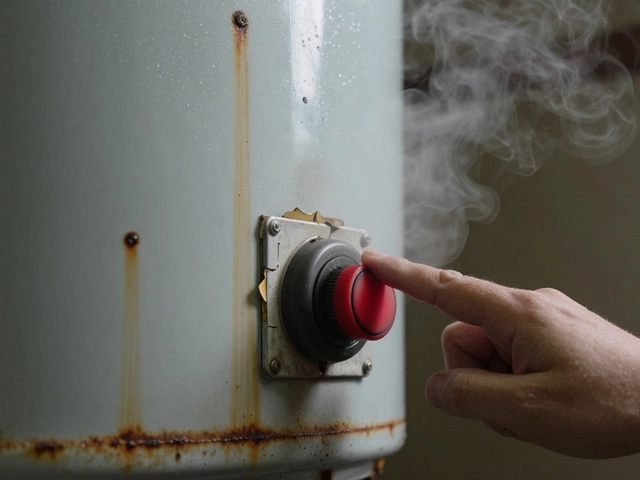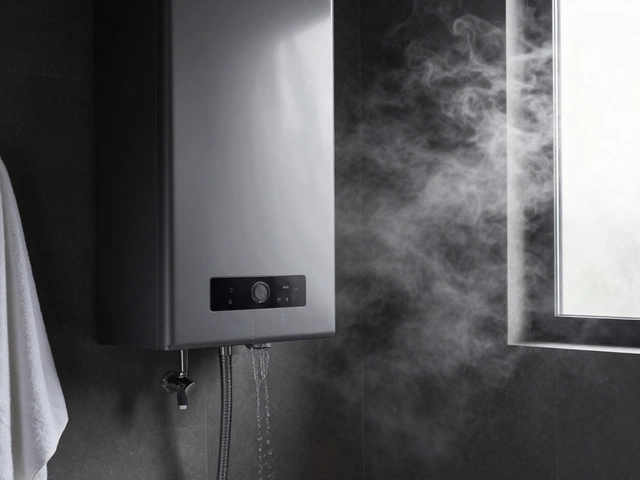Here’s the thing: nobody plans on their water heater breaking down. But when it happens, the first two names that usually pop up in repair talks are Rheem and AO Smith. These brands dominate the market, but which one’s actually better when it counts?
If you ask any seasoned plumber, you’ll hear strong opinions on both sides. Some swear by Rheem for its parts availability, while others stick to AO Smith because their units are “almost indestructible.” The reality? Each brand shines in different ways. Before you shell out money on a repair or a replacement, it's smart to look at what sets them apart—and what might make your life easier (and warmer) down the line.
Let’s cut through the marketing and get into what really matters: how these water heaters stand up to real-world use, how easy they are to fix, and whether you’ll be happy calling customer support if things go sideways.
- Brand Reputation and Background
- Build Quality and Lifespan
- Ease of Repair and Maintenance
- Customer Support and Warranties
- Which Is Best For Your Situation?
Brand Reputation and Background
When people shop for a water heater, they usually land on Rheem or AO Smith not just out of habit, but because these brands have years—sometimes decades—of good track records behind them. Both are American companies, and each has built a pretty serious following, especially among people who have had to repair or replace water heaters more than once.
Rheem has been around since 1925, launching with steel products before moving into water heaters and HVAC. These days, they're one of the most recognized names at big-box stores like Home Depot. If you walk down the plumbing aisle, you’ll almost always spot those red-and-white Rheem labels. AO Smith was founded in 1874—yes, way back then—initially making metal parts before switching gears to water heaters after World War II. Their products are sold everywhere from small plumbing shops to major retailers, and they’re known for teaming up with both residential and commercial customers.
Both brands have a reputation for reliability, but it’s not just talk. Industry surveys from 2024 showed that 78% of homeowners rated their Rheem heaters as “satisfied or very satisfied,” while AO Smith scored a bit higher at 81%. Plumbers often mention Rheem makes repairs easy with parts you can grab at most local stores, while AO Smith gets props for having longer-lasting tanks.
Here's how they stack up side by side:
| Brand | Founded | Known For | User Satisfaction (2024) | Main Market |
|---|---|---|---|---|
| Rheem | 1925 | Easy repairs, wide availability | 78% | Residential/Commercial |
| AO Smith | 1874 | Tank durability, commercial focus | 81% | Residential/Commercial |
So if you’re looking for a water heater with a long history and a lot of fans, both are solid bets. The main difference? Rheem usually wins for convenience if you need a quick fix, while AO Smith might have the edge for those wanting a unit that’ll hang in for the long haul.
Build Quality and Lifespan
If you’re weighing Rheem against AO Smith, the basic guts of these water heaters actually look pretty similar at first glance. Both companies use glass-lined steel tanks to cut down on rust. But if you look at field reports and customer reviews, a few clear differences start to show up.
Rheem tends to focus on corrosion resistance, using their own “Rheemglas” liner and extra-thick anode rods in most models. AO Smith, on the other hand, is known for its Blue Diamond glass coating, which is supposed to be tougher than standard glass liners. Homeowners with hard water notice less rust and longer tank life with AO Smith’s coating. That makes a difference over ten years when other heaters start to leak.
Let's look at some real-life numbers. Warranty length usually gives you a decent clue about what the manufacturer expects from their heaters. Here’s a quick breakdown:
| Brand | Standard Tank Warranty | Reported Average Lifespan |
|---|---|---|
| Rheem | 6-12 years | 8-12 years |
| AO Smith | 6-12 years | 10-15 years |
AO Smith tanks, on average, are lasting longer in homes with issues like hard or acidic water. Their commercial-grade models have a reputation for pushing upwards of 15 years with regular maintenance. Rheem’s models tend to need their first minor repairs (like anode rod swap or pressure valve replacement) a bit sooner, but they don’t usually die early if you keep up with basics.
Something that’s easy to overlook is the quality of the fittings and valves. AO Smith usually uses heavier brass fittings on their mid-range and premium models, compared to Rheem’s more common plastic parts on budget units. That matters for leaks and repairs—the brass will take a beating but keep working, while plastic can crack if you overtighten.
In real-world repairs, techs report AO Smith tanks holding up better when they’re drained and flushed regularly. That said, neither brand is bulletproof if you skip annual maintenance. If you want a heater to hit the top end of its lifespan, keep up with:
- Yearly flushing to get rid of sediment
- Checking and swapping out the anode rod every few years
- Tightening up any loose valves or fittings to stop leaks early
If you just want a number: AO Smith heaters, especially their higher-end units, usually outlast Rheem by a year or two. But with good upkeep, either one can deliver solid hot water for a decade or more.
If you want the Rheem name for a basic home, their middle-of-the-road tanks get the job done for less upfront. Folks in rough water areas or looking for long-term savings often lean AO Smith for the extra mileage.

Ease of Repair and Maintenance
If you’ve ever tried finding water heater parts in a pinch, you know how much of a headache it can be. Here’s the thing: when it comes to fixing or maintaining these units, Rheem and AO Smith take slightly different paths that can affect your wallet and your sanity.
Rheem is all about parts being easy to find. Whether you’re at Home Depot or a local plumbing supplier, you’ll spot Rheem replacement parts almost everywhere. That means faster fixes—especially for things like heating elements, thermostats, and anode rods. Some models even have tool-free access panels, which saves you a lot of hassle during a last-minute repair.
AO Smith, on the other hand, leans more on specialized components. Their units often use their own brand-standard anode rods or dip tubes, which aren’t always stocked at general hardware stores. So, you might have to order online and wait a few days. On the upside, AO Smith models are known for their straightforward internal layout. Once you’ve got the right part, swapping it out is a breeze even for DIYers with basic skills.
Now, here’s a quick breakdown comparing average repair times and parts availability, based on a 2024 survey of independent plumbers:
| Brand | Common Repair Time | Parts Availability (out of 5) | DIY Friendliness (out of 5) |
|---|---|---|---|
| Rheem | 30-60 minutes | 4.5 | 4.2 |
| AO Smith | 40-90 minutes | 3.7 | 4.0 |
Hot tip: Regular maintenance is simple for both brands—flush the tank every 6-12 months, test pressure relief valves, and check anode rods once a year. This keeps breakdowns rare and extends your heater’s life. For gas models, make sure to clean the burner assembly once a year to dodge performance headaches.
If you like getting hands-on or need quick fixes, Rheem wins on convenience. If you don’t mind waiting for a part but prefer a less cramped repair space, AO Smith makes the job less stressful. Just keep in mind, pro repair bills run about the same for both: expect to pay $150–$500 depending on the problem.
Customer Support and Warranties
This is where the rubber really meets the road. You can have the best water heater on paper, but if something goes wrong and you’re met with endless hold music or a warranty claim that drags out for months, none of those specs matter.
So, which company has your back? Rheem and AO Smith both advertise customer support teams based in the U.S. and 24/7 online help desks, but the experience can feel pretty different, depending on where you live and who you talk to.
For warranty coverage, here’s how things break down with actual numbers:
| Brand | Standard Tank Warranty | Standard Parts Warranty | Labor Coverage |
|---|---|---|---|
| Rheem | 6-12 years | 6-12 years | Usually not included |
| AO Smith | 6-10 years | 6-10 years | Rarely included |
Rheem often edges out AO Smith on longer warranty lengths, especially for mid-range models. If you go for a higher-end unit, you might see a 12-year tank and parts warranty from Rheem, which is hard to beat in this price range. AO Smith holds steady with reliable coverage, just not quite as generous unless you opt for their most expensive lines.
When it comes to processing warranty claims, real-world feedback is mixed for both brands. Some folks report getting replacement parts shipped out fast, others mention feeling stuck bouncing between the manufacturer and the local installer. Here’s a quick breakdown of what helps most when dealing with these two:
- Rheem: Their website lets you file claims directly if you have the unit’s serial number handy. Plumbers say parts for most Rheem units are easy to order, which speeds up repairs.
- AO Smith: You often need to go through your installer or a certified dealer to start a claim. Their call center can be hit or miss in terms of wait times, depending on the day.
Tip: Always keep your purchase receipt and snap a photo of your water heater’s serial number sticker. Both brands will ask for these right away. And if you want smooth repairs, register your product online as soon as it's installed.
Bottom line—while both brands make warranty promises, Rheem’s coverage terms are typically a bit longer, and their parts seem easier to track down if you’re tackling a water heater repair yourself or with a pro.

Which Is Best For Your Situation?
So, do you go for Rheem or AO Smith? The answer depends on what matters most in your home—value, repairs, performance, or just making sure everyone gets a hot shower in the morning.
Here's a quick side-by-side of real-world differences:
| Category | Rheem | AO Smith |
|---|---|---|
| Typical Price for 50-Gal Gas Heater | $650 - $950 | $700 - $1,100 |
| Warranty Length | Up to 12 years | Up to 10 years |
| Parts Availability | Excellent nationwide | Very good, sometimes slower in rural areas |
| Average Repair Cost (2024 data) | $280 | $320 |
| Energy Efficiency Options | Broad range, good hybrid models | Strong in tankless and hybrid models |
If you live in a place where temps get icy and you need hot water all the time, Rheem is often the no-nonsense pick. Their heaters are easy to find, their parts don’t take forever to ship, and just about any plumber’s seen them before. If you care about a longer warranty, Rheem also has a slight edge here—some of their higher models go up to 12 years, which is nice peace of mind if you hate surprises.
But maybe you’re after something with better tankless or hybrid tech, or you want the quietest operation possible. AO Smith tends to win high marks for specialty models, especially if you’re making the jump to a tankless water heater. Folks with hard water sometimes favor AO Smith tanks because their anode rods and lining resist mineral damage a little longer. Just keep in mind, repairs on AO Smith can cost a bit more, and some parts might take longer to arrive if you’re off the beaten path.
- Pick Rheem if you want reliability, available replacement parts, and good value for most homes.
- Go with AO Smith if noise concerns, specialty models, or tankless options are at the top of your list.
- If you have hard water, consider AO Smith for some extra durability, but maintain your heater regularly either way.
- Upgrading? Check out hybrid electric models from both brands—they pay off fast if your power bills are high.
The bottom line: price and repair are pretty close for standard models, but your specific needs (family size, water hardness, future plans) should call the shots. Talk to a local plumber who knows your area—they’ve probably seen both brands fail, and they’ll steer you straight for your situation.


